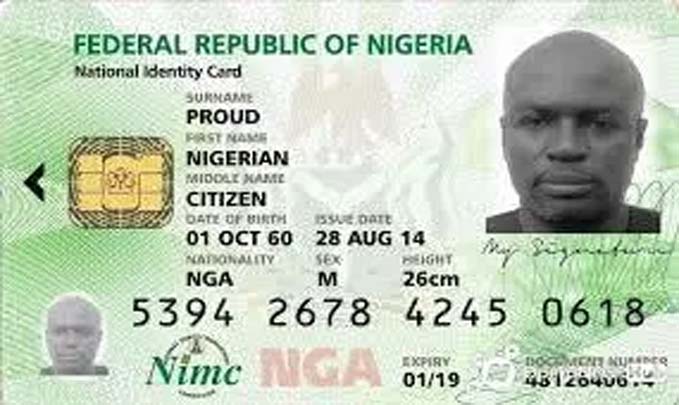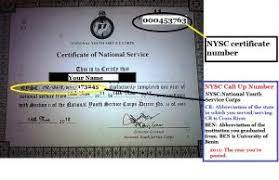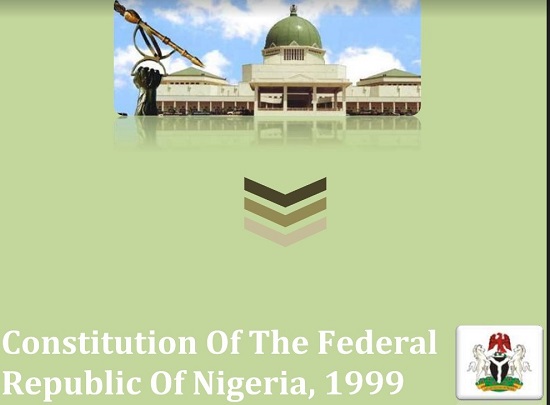Last updated on December 19th, 2023 at 12:10 pm
Formerly known as the Department of National Civic Registration (DNCR), the National Identity Management Commission has failed in its mandate to provide National Identity Card for more than 200 million Nigerians at home and in the diaspora. And the commission doesn’t look apologetic about its failure.
Established by the NIMC Act No. 23 of 2007, some of its mandates include:
1) To establish, own, operate, maintain and manage the National Identity Database in Nigeria
2) To allocate Unique National Identification Number (NIN) to every Nigerian
3) To issue a token General Multi-Purpose Card (GMPC) to a Nigerian citizen
4) Power to make regulations connected with its functions.
Since its establishment or name change, NIMC has been one of the government agencies through which monies are dubiously diverted to coffers of government officials.
It started on a bad note during the administration of Chief Olusegun Obasanjo. Over N120 Billion was either wasted or embezzled by government officials who awarded contracts worth several millions of US dollars.
Late Sunday Afolabi (former Interior Minister), Sagem SA, Niji Adelagun, Rufina Akerele, and Hussaini Akwanga top the list of national identity card bribery scandal, VOA News says.
National Identity Management Commission problem is multi-faceted and dynamic.
Here are some of the major reasons why the NIMC registration has failed over and over again, and it may continue to fail to achieve its objectives of issuing a workable national identity card to Nigerians:
- Bribery and corruption
- Backlogs of National ID card
- Favouritism
- Poor synergy
- Poor supervision
- Ineffective coordination
- Inaccessible NIMC portal
- Primitive registration
- Fire brigade approach
- Non-responsive Social Media handles
Bribery and corruption
NIMC foundation was built on corruption since its creation when the Late Afolabi, who was a strong proponent of the National Identity Card project, was a minister during Obasanjo’s regime.
He and his cohorts were accused of seeking bribe worth $2m from the French firm, Sagem in connection with the national ID card project.
In a report, a Nigerian, Niji Adelagun, said to be the frontman for Sagem was accused of paying out $1.7 million in bribes between 2001 and 2003. He allegedly gave the money to leading Nigerian officials in the ministry of interior.
While Rufina Akerele of the ministry allegedly received $500,000 which was paid into her London account with Barclays Bank, the minister and the brainchild of the national identity card project Afolabi, allegedly received $345,000 to support SAGEM SA’s bid.
It was also alleged that a former Labour Minister, Hussaini Akwanga, got $30,000 which was paid to his daughters in Dublin for their school expenses.
None of the accused pleaded guilty when the case came up in courts in 2003 and a few years after.
Afolabi died in London in May 2004 and by the following month, the court dropped all charges against him, signalling the natural death of the ID card project scandal.
Till now, some of the officials of the commission shamelessly indulge in bribery and corruption while NIMC continues to claim that registration is free. The cost of registration varies.
It also continues to claim ignorance to some of the corruption allegations levelled against some of its officials during enrolment.
Backlogs of National ID card
A few weeks ago, the Minister of Communications and Digital Economy Isa Pantami through of the agencies under his control says the mobile line will be blocked if the subscriber fails to link it NIN.
He handed down the militarised memo to the Nigerian Communications Commission (NCC), an agency that controls the operation of telecommunication firms in Nigeria.
There is no problem with creating a national database, what irked Nigerians most is the fact that those who were enrolled more than five years ago were yet to get their ID card.
The minister should have taken his time to ensure that the NIMC takes measures to settle its backlog of people waiting for NINs after enrolment several years ago.
One of the millions of Nigerians who are frustrated by the registration says, “Most enrolments are listed in transit”.
Pathetically, NIMC Director-General Aliyu Aziz in May 26, 2020 report vaguely claimed that it had issued 41 million Nigerians with National Identity Number.
He also told reporters that enrolment was ongoing for Nigerians in the Diaspora in 15 other countries across the world, saying it would be the only valid means of identification for government services by law.
“As of today, we have reached record 41 million by sheer determination and hard work. I owe all of this to the great staff of the NIMC who pushed themselves beyond their limits to see this happen,” he was quoted as saying.
Favouritism
In most of NIMC offices, enrolment is based on “who you know” if you don’t want to spend days or weeks before your biometric data is taken.
One of the prospective applicants said he spent days and financial resources before he lost faith in the process.
“Like many people, I spent days queuing up in Lagos to enrol. Waking up very early in the mornings to make that ardour journey.
“I gave up after a few days trial following my observation of people (presumably families, friends and acquaintances of the elite) being bused in and walking straight into the offices announce completing their enrollment ) whilst us plebeians were loyally queuing up in some of the most unconducive environment.
“Thinking I will get a better option abroad( as i live there) Following my arrival in the UK I made my application accordingly having duly paid the required fee. However, almost a year later, the same issues persist.
“No number and no responses to communication. What exactly does this dis(honourable minister) think of those, who have enrolled and are yet to get their NINs?”
Poor synergy
To think that NIMC with less than 40 offices would be able to capture data of Nigerians is err.
It was a great idea when it announced its partnership with local government council areas across Nigeria.
But there is a problem!
Some of the LGA offices of NIMC complained that they do not have biometric machine.
Corroborating this, one Adeleke said:
“I try to register my family members online under pre-enrollment page successful, on getting to your office at Public Service Institute Dutse Junction, Abuja, the woman said the machine to capture my printout is not available here. Then I have to get the form fill and queue. Why??” @Adelekewall
Poor supervision
Some of the state offices of NIMC operate like a personal businesses because of lack of supervision and proper coordination from Abuja.
Ineffective coordination
What’s the benchmark of enrollments per state per month or week or per day? This is one of the problems why NIMC have been snalling in the process of registration and capturing of the biometric data of Nigerians.
Inaccessible NIMC portal
A few days ago the official website of NIMC crashed due to the influx of NIN applicants who needed more information about the exercise.
Its DG claimed that he and his team were working on upgrading the NIMC system. It took them more than four days before they could have the portal back online.
In a country where the government is proactive, the workable portal should have been the first thing not putting the cart before the horse.
Primitive registration process
It’s disheartening and shameful that applicants will have to print form, fill and take to enrolment centres.
Even as NIMC directed applicants to download NIN form, fill and take it to the enrolment centre, some of its officials still sell the enrolment form. Some centres have been accused of rejecting the downloaded form for them to sell the copies in their office.
The world has gone digital than the way the management NIMC is handling the registration process.
Nothing is digital about the ministry of communication managed by Pantami and his team. Very Sad!
Fire brigade approach
When it should have put its house in order before threatening to block SIM cards, it realized that it was toeing the wrong path when Nigerians took to social media platforms to expose some of the anomalies in the registration exercise.
Non-responsive Social Media handles
NIMC erroneously that it provides 24-Hour Customer Service. A check on its social media handles and tweets shows that it is indeed non-responsive.
Several inquiries by prospective applicants remain there unattended to. We put this to test by sending an inquiry to the commission, till the time of publication (more than four weeks) there is a response.
Way forward
Thankfully, Aliyu Aziz acknowledged some of the problems confronting NIMC in a The Punch report, when he highlighted challenges slowing down the rate of enrolment as inadequate electricity, Information Technology infrastructure, inadequate enrolment centres and devices and insufficient sensitisation and awareness of the public, among others.
He promised that the challenges are being addressed in collaboration with all the relevant stakeholders, government and with the help of the media.
The solutions to NIMC Problems
1) Value human lives first before citizenship identification
2) Bring in the machine to reduce physical contact with some of the corrupt officials. For instance, enrolment form should be designed in such a way that it would be stored on the NIMC pre-registration database with a unique number for applicants to take to the enrolment centre for biometric.
3) Biometric machines should be provided to the LGAs for a workable synergy. You don’t expect the underfunded LGA which does have financial autonomy to procure equipment for data capturing for an agency of the Federal Government.
4) Monitoring and supervision mechanism should be put in place to curb the excesses of state officials.
If possible, sufficient punishment should be meted out on officials whose attitude is capable of jeopardizing the mandate of the commission.
5) There should benchmark on the number of Nigerians each of state offices capture per week.
6) From time to time, NIMC portal crashes or run out of bandwidth. The commission knows the number of Nigerians who are yet to enrol, as such, it should have opted for the highest bandwidth to avoid intermittent offline mode.
Most of its supposed useful links on Google search return on error (nimc.gov.ng/fg-approves-enrolment-agents-to-boost-nin-enrolment/) returned 404 Not found at the time we checked (16:27).
7) Digitalise the enrolment to reduce the primitive registration process.
8) Plan well, test the process put in place before making the public announcement
9) NIMC should engage the services of social media managers or an expert in customer relations.
Its presence on the social media platforms should be explored positively just the way N-Power utilised its presence on social media before the youth empowerment scheme was moved to the Ministry of Humanitarian Affairs.
Final thought:
We hope that the recent collaboration with private firms in the enrolment process will complement the efforts of the commission in producing the best National identity card for Nigerians at home and in the diaspora.








